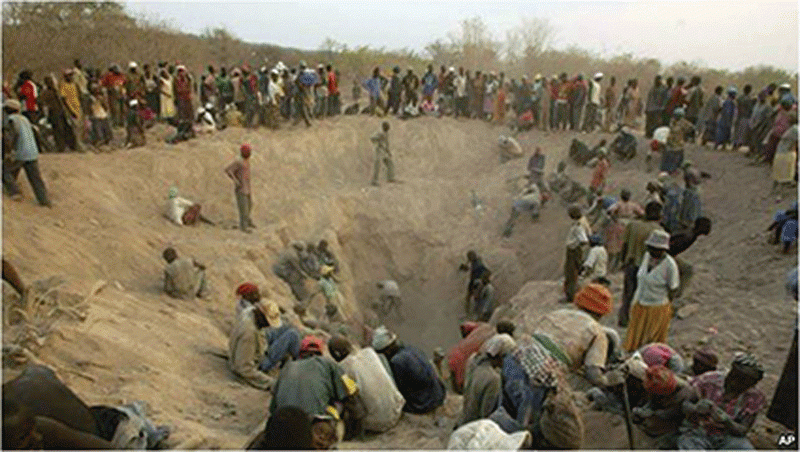
In the heart of Zimbabwe, where the land is rich with minerals, one critical resource to human life is under threat — water.
As mining activities surge in districts like Hwedza, Buhera and Goromonzi, local communities grapple with the harsh reality of diminishing water resources.
With their livelihoods hanging in the balance, villagers are coming together to advocate for the protection of their most vital resource.
Through community education and awareness training spearheaded by the Community Water Alliance (CWA) and local organisations, villagers are learning to navigate the complexities of water security in an era dominated by mining interests.
Voices from villagers, Zimbabwe National Water Authority (Zinwa), local government officials and environmental experts echo the urgent need for sustainable management as communities confront the spectre of displacement and dwindling water supplies.
Mining in Zimbabwe has long been a double-edged sword, promising economic growth while simultaneously threatening the environment and local communities.
The extraction of lithium, diamonds, phosphate and steel has intensified in recent years, leading to increased water abstraction, raising alarm bells among local inhabitants and experts alike.
"Water is life and we are witnessing a crisis that could escalate if we do not act now," warns an official from Zinwa, referring to himself as Mark. "The rising demand for water from mining companies is putting immense pressure on our already vulnerable water tables."
- FC Platinum bounce back
- New perspectives: ‘We also died for this country!’
- Mayor calls for unity as 8 CCC cllrs sworn in
- New perspectives: ‘We also died for this country!’
Keep Reading
Local government officials are equally concerned. "We have a responsibility to ensure that our communities have access to safe and sufficient water," says Patience Mufundisi, a district official at Murambinda.
"However, the rapid expansion of mining activities is complicating our efforts. We need to balance economic development with environmental sustainability."
As the mining boom unfolds, local villagers find themselves at a crossroads. Many express frustration and fear over the changes happening in their environment.
"We have lived here for generations, relying on these water sources for farming and daily life," shares Blessing Nyoni, a farmer from Hwedza. "Now, we see our wells drying up and we worry about what will happen to our families and crops."
The community education programmes organised by CWA aim to empower these villagers with knowledge about water security and their rights. "We want to equip our community members with the tools to advocate for themselves," explains Chris Gowori, CWA programmes officer.
"Understanding the implications of mining on water resources is crucial for their survival," he pointed out.
During a recent community training session, local villagers gathered to discuss the impact of mining on water supply. "It’s not just about the water we drink; it’s about our entire way of life," emphasises Rudo Chaka. "If we lose our water, we lose our farms, our health and our future."
Experts in development and environmental sustainability highlight the urgency of addressing water security issues.
Kudzai Moyo, an environmental scientist, notes: "The interplay between mining and water resources is complex. While mining can drive economic growth, it often comes at a significant ecological cost. Sustainable practices must be implemented to protect these vital resources."
Advocacy for responsible mining practices is gaining momentum as community voices grow louder. Local government officials and NGOs are seemingly working together to establish regulations that protect water resources while allowing for economic development.
"We need to ensure that mining companies are held accountable for their water use and that they contribute to the communities they affect,” said Ernest Mudzoto.
As mining activities expand, some villagers have experienced unexpected displacements, further complicating the water security crisis. "We were forced to leave our homes to make way for mining operations around Marovanyati Dam," recounts Nyoni.
"Now, we are struggling to find enough water in our new location, which is impacting our health and livelihoods."
Marovanyati Dam is currently above 70% full, an attribute to the just-ended and extended rainfall period.
Community education sessions are addressing these displacement issues by fostering solidarity among residents. "We need to stand together to demand our rights," urges Dube. "Our voices must be heard in discussions about water management and mining policies."
The situation in Hwedza, Buhera and Goromonzi serves as a stark reminder of the need for integrated water resource management that considers the needs of local communities.
Zinwa official calls for a collaborative approach
“We must engage all stakeholders — government, mining companies and communities, to create a sustainable framework for water use that protects our resources and ensures long-term access for all.”
As training sessions continue and community members become more informed, there is hope for a future where water security is prioritised.
"We are learning to advocate for ourselves and protect what is rightfully ours," Chaka said. “Water is life and we will fight for it."
The burgeoning mining activities in Zimbabwe present both opportunities and challenges for local communities. While the promise of economic growth is enticing, it is essential to prioritise water security and sustainable practices to safeguard the well-being of residents.
Through education, advocacy and collaboration, communities in Hwedza, Buhera and Goromonzi will navigate this complex landscape, ensuring that their voices are heard and their water resources protected.
The water fight is not just about survival; it is about preserving the essence of life for generations to come, noted Hardlife Mudzingwa, CWA executive director.










